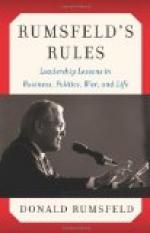If it is well that we at home should appreciate the splendid results of many years of good teaching given to the officers and men of the Army, results to be attributed in great part, though not exclusively, to the efforts of Lord Wolseley and his school, it is no less our duty to face squarely the fact that the Nation has not done its duty by this Army. The Nation in this sense means the people acting through the Government. To see how the Government has treated the Army we have only to survey the situation in South Africa. Fifty thousand men were ordered out on October 7th,—an Army Corps, a cavalry division and troops for the line of communications. The design was that, with the communications covered by the special troops sent for that duty, the Army Corps and the cavalry division, making together a body of forty thousand men, should cross the Orange River and sweep through the Free State towards Pretoria, while Natal was protected by a special force there posted.
But long before the Army Corps was complete this plan had been torn to pieces by the Boers. Sir George White’s force, being hardly more than a third the strength of the army with which the Boers invaded Natal, could not stop the invasion, though it could hold out when surrounded and invested.
Accordingly the first task of Sir Redvers Buller was to stem the flood of Boer invasion in. Natal and to relieve Sir George White. For this purpose he is none too strong with three out of the six infantry brigades that make up the Army Corps. The remaining three brigades could not carry out the original programme of sweeping through the Free State, and meantime the Boers have overrun the great district between Colesberg and Barkly East, between the Orange River and the Stormberg range. General Gatacre with a weak brigade at Queenstown is watching this invasion which as yet he seems hardly strong enough to repel. The rest of the troops are required in the protection of the railways, of the depot of stores at De Aar, and the bridge at Orange River. But Kimberley was invested and Mafeking in danger, and the effect of the fall of either of them upon the Cape Dutch might be serious. Something must be done. Accordingly Lord Methuen with two brigades set out towards Kimberley. His task is both difficult and dangerous; he has not merely to break the Boer resistance by sheer hard fighting, but to run the risk that Boer forces from other quarters, perhaps from the army invading Cape Colony, may be brought up in his rear, and that he may in this way be turned, enveloped, and invested. The scattering of forces is due to the initial error of sending too small a force to Natal, and of making no provision for its reinforcement until after a six weeks’ interval. The consequence is that instead of our generals being able to attack the Boers with the advantage of superior numbers, with the concomitant power of combining flank and frontal attacks, and with the possibility of thus making their victories decisive by enveloping tactics or by effective pursuit, the British Army has to make attack after attack against prepared fronts, which though they prove its valour can lead to no decisive results, except at the cost of quite disproportionate losses.




